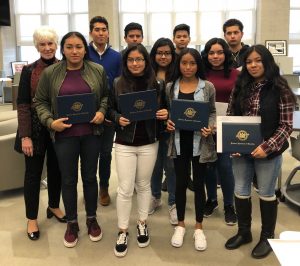
Secretary of Education Susan Bunting today honored the first students in the state to earn Delaware’s new Certificate of Multiliteracy, which recognizes and honors students for attaining high levels of proficiency in languages in addition to English.
“Proficiency in multiple languages is a critical career skill in today’s workplace,” Bunting said. “This certificate provides the students with a credential that will help differentiate them on job, college, and scholarship applications as well as military admissions documents.”
The Certificate of Multiliteracy is Delaware’s version of the Seal of Biliteracy, which is a national response to recognize the importance of language learning both socially and economically. The certificate is a tangible reminder to students of the benefits of bilingualism and multilingualism.
Representative Joe Miro was the primary sponsor of Delaware’s Certificate of Multiliteracy bill, which was established by House Joint Resolution (HJR) 4 and signed by Governor John Carney on July 21.
“I am excited that Delaware now has the opportunity to recognize students for learning new languages and that we will encourage them to pursue such studies,” Carney said. “These are critical skills that our students will need to succeed in life and our employers will need of their workers to succeed in the marketplace.”
Beginning this school year (2017-18), the Department of Education will review applications for the Certificate of Multiliteracy four times a year: in November, February, May and July.
Rep. Miro, a Cuban native, said, “Earlier this year, on March 30th, I recognized the 55th Anniversary of my coming to the United States from Cuba. At 13 years old, I was among 14,000 unaccompanied Cuban children who immigrated to the U.S. between 1960 and 1962. So, it’s safe to say that I understand the value of maintaining proficiency in a child’s native language in order for the student to achieve academic success in Delaware. I am proud to see our first set of students being recognized for this accomplishment.”
Colonial School District was the first to help students apply for this prestigious recognition. Bunting visited William Penn High School today to present the certificates to 11 students recognized for achieving high levels of language proficiency in Spanish and in English:
• Guadalupe Aguilar
• Bryan Arrendondo
• Emmanuel Balderas Ramirez
• Ariana Bernal
• Karen Fuentes
• Stephanie Gomez
• Favian Monroy
• Gabriella Ortiz-Ramos
• Alison Ramirez
• David Ruiz-Garcia
• Maricela Tapia-Sanche
Learn more about the certificate and how schools can apply on behalf of their students here.
Media Contact: Alison May, alison.may@doe.k12.de.us, 302-735-4006